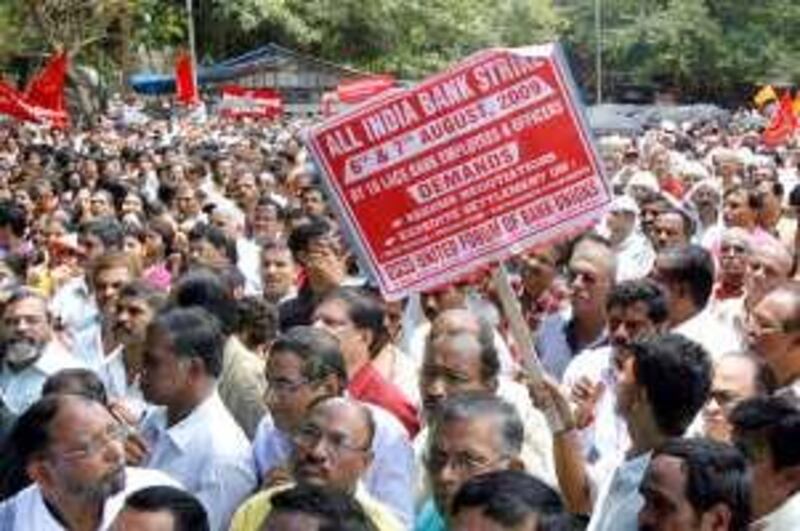MUMBAI // Bosch, a German car parts maker, declared a lock-out this month at one of its plants outside Bengaluru due to worsening labour unrest. More than 700 workers have been suspended from the plant, which makes spark plugs, as they step up demands for their wages to be doubled to deal with soaring food prices.
"They are asking for too much of a hike, which is not the industry norm," the company said. Production at the plant has dropped off significantly since last month and Bosch has accrued losses of 40 million rupees (Dh3.2m) every day. The labour unrest is the latest in a series of disputes that have rocked India in recent years. Despite the manufacturing sector in most developed economies continuing to reel under the recessionary slowdown, India's industrial output has surged in recent months. In January, it rose 16.7 per cent from a year earlier as the country's factories produced more cars, trucks and cement.
Pranab Mukherjee, the Indian finance minister, says such strong factory output will power economic growth through the next financial year. But a rash of labour disputes plaguing manufacturing units around the country is threatening India's industrial muscle. Labour strikes are affecting big and small companies, from Indian manufacturers such as Mahindra and Mahindra to foreign players operating in the country, such as South Korea's Hyundai and the Swiss company Nestle.
In the first quarter of last year, 473,433 man days were lost because of labour strikes and lockouts, according to India's bureau of labour. In April and July last year, workers at Hyundai staged sit-ins to demand reinstatement of some suspended workers and the recognition of an outside union. In September, in a similar dispute at Japan's Honda, workers stopped testing a new assembly line saying it threatened the jobs of several engineers and executives.
In another incident, a helicopter belonging to the tycoon Anil Ambani was sabotaged last April. Eventually, some restive workers of the firm responsible for maintaining Mr Ambani's helicopter were accused of tampering. "Labour unrest is not something new to India," says EM Rao, a professor at the Xavier Labour Research Institute in Jamshedpur. "What has changed in the post-globalisation phase is the realisation among the working class that they could wield enormous destructive power [through strikes and protests] and raise unreasonable demands on the management."
Layoffs, too, have often threatened to spark social turmoil in this crowded democracy of 1.1 billion people. In October 2008, during the peak of the economic slowdown, activists from the labour wing of the Shiv Sena, a nationalist political party, vandalised the lobby of the InterContinental Grand in Mumbai to protest against the sacking of 21 hotel staff. In the same month, when Jet Airways, a money-losing private airline, laid off 1,900 employees, the crews staged aggressive protests outside the airline's office in Mumbai. Political pressure mounted as well.
The Maharashtra Navnirman Sena, another nationalist political party, warned the airline that its activists would not allow a single flight to take off if it did not reinstate the sacked employees. The next day, Jet rescinded its move and rehired all of them. In some instances, aggrieved workers have even resorted to murder. In late September that year, Lalit Kishore Choudhary, the chief executive of Graziano, an Italian car parts maker based in Noida, an industrial centre in northern India, was beaten to death by sacked employees.
In response, India's labour minister, Oscar Fernandes, said: "This should serve as a warning for the managements. It is my appeal that the workers should be dealt with compassion." He later apologised after some industrialists said his comments were insensitive. Today, companies often view the issue of redundancies with trepidation. Many are looking for innovative ways to prune staff and cut costs. Some are making lay-offs under the guise of natural attrition, pressuring employees to voluntarily resign.
"We can't have the American-style hire 'n' fire in India," says Paranjoy Guha Thakurta, a Delhi-based commentator on India's political economy. "It has to be done in a more humane way. There has to be a 'golden handshake' or there will be social strife." Though India has posted an average 8 per cent growth rate for the past five years, workers claim the spoils have not been shared with them. "There will be unrest," warned B Raja Gopal, the national secretary for the Bharatiya Mazdoor Sangh, an Indian workers' union. "People cannot cope with the food price hike and no employer is willing to pay the actual wages in accordance with the price hike."
India saw militant trade unionism in the 1970s and 1980s, supported by left-leaning political parties. Labour turmoil in recent years, however, has not always been orchestrated by unions. The business environment has changed dramatically since India liberalised its economy in the early 1990s, introducing companies to competition, and managements could no longer afford to pander to union demands. In fact, the share of formal or organised sector employment, whose members enjoy some protection via insurance and legally binding contracts, in total employment has been falling, from 7.3 per cent in 1993-1994 to 5.8 per cent in 2004-2005. Employment in the organised sector dropped, too, from 27.7 million in 2001 to 27 million in 2003, according the National Sample Survey Organisation.
Workers outside of the organised sector are not insulated by legal contracts, benefits or insurance. Growing employment in the non-organised sector, where workers are exposed to greater job insecurity, has fuelled unrest, analysts say. But the problem, says Mr Rao, is more to do with ineffective and incompetent employers than with the workers themselves. India's labour laws do not prevent the employers from taking disciplinary action against workers who are guilty of infraction or for concerted absence or stoppage of work.
"What is lacking is qualified, experienced and competent personnel and industrial relations managers, and the necessary will on the part of employers," he says. business@thenational.ae





